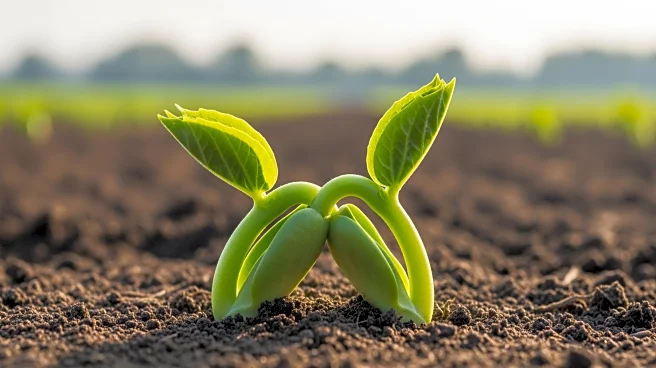What's Happening?
Union Minister of Commerce and Industry Piyush Goyal met with Israel's Minister of Agriculture and Food Security, Avi Dichter, to discuss enhancing cooperation in agriculture. The meeting focused on leveraging
Israel's expertise in precision farming, drip irrigation, desert agriculture, and sustainable agricultural practices. Goyal shared insights from the meeting on social media, emphasizing the potential for collaboration in technology and innovation. During his visit, Goyal toured the Peres Center for Peace & Innovation, highlighting Israel's advancements in creativity and technology. The discussions also included the possibility of establishing a startup bridge between India and Israel, following the signing of Terms of Reference for a Free Trade Agreement.
Why It's Important?
The collaboration between India and Israel in agriculture and technology is significant as it could lead to advancements in sustainable farming practices and innovation. Israel's expertise in precision farming and irrigation can help India improve its agricultural productivity and sustainability. Additionally, the potential startup bridge could foster innovation and growth in both countries' tech sectors, enhancing their global competitiveness. This partnership aligns with India's aspirations to become a global leader in startups and innovation, offering opportunities for economic growth and development.
What's Next?
Following the signing of the Terms of Reference, India and Israel will explore various elements of their partnership, including technology and innovation. The focus will be on sectors such as cybersecurity, mobility, climate action, green steel, and med-tech. The collaboration aims to promote India's startup ecosystem, leveraging Israel's expertise to achieve high-quality innovation at competitive prices. The next steps involve detailed negotiations for the Free Trade Agreement and identifying specific areas for joint initiatives.
Beyond the Headlines
The partnership between India and Israel could have broader implications for global agricultural practices and technological innovation. By combining resources and expertise, both countries can address challenges such as climate change and sustainable development. The collaboration may also influence other nations to adopt similar strategies, fostering international cooperation in technology and agriculture. This initiative highlights the importance of cross-border partnerships in driving progress and addressing global issues.









